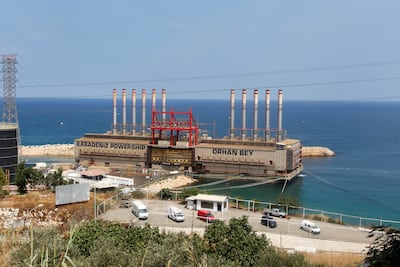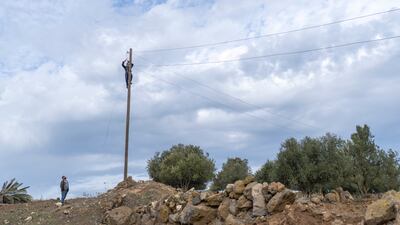Syria is to receive two floating power plants from Turkey and Qatar that will supply 800 megawatts – equivalent to half of what is currently generated in the country – an official said on Tuesday.
This came a day after US eased sanctions on Syria, under its transitional government.
“Work is currently under way to secure transmission lines to receive electricity from where the two ships will be docked, and electricity transmission lines will be extended from them to the nearest transformer station to be connected to the electricity grid,” Khaled Abu Dai, director general of the general establishment for electricity transmission and distribution, told Syria's official news agency Sana.
He said the extent of damage to power plants, transformers and power lines under the former regime of Bashar Al Assad was extensive. “We seek to rehabilitate the generation stations and transmission lines so that the network is able to transmit energy,” said the official.
Mr Abu Dai did not say when the two ships would arrive.

President Joe Biden's administration on Monday eased some US sanctions on Syria to allow quicker delivery of humanitarian aid to the new government in Damascus, after the removal of former president Bashar Al Assad's regime last month, following more than 13 years of civil war.
For an initial six months, the move will allow the Treasury Department to issue waivers to aid groups and companies providing essentials including water, electricity and other humanitarian supplies.
“This action underscores the United States’ commitment to ensuring that US sanctions do not impede activities to meet basic human needs, including the provision of public services or humanitarian assistance,” the US Treasury said.
The announcement followed a meeting in Damascus between Ahmad Al Shara, leader of the Hayat Tahrir Al Sham group, and the top US diplomat for the Middle East, Barbara Leaf. Ms Leaf led the first US diplomatic delegation into Syria since Mr Al Assad was ousted last month. The US and UN have long designated HTS, which formerly had links to Al Qaeda, as a terrorist organisation.
HTS led a lightning rebel offensive that ousted Mr Al Assad on December 8, ending more than 50 years of his family’s rule over Syria. A popular uprising against Mr Al Assad in 2011 turned into a civil war that has killed an estimated 500,000 people and forced millions to flee abroad.
Much of the world ended diplomatic relations with Mr Al Assad because of his violent crackdown on the protests. Western-led sanctions targeted the former president and his allies Iran and Russia over for the crackdown and subsequent war.
Sanctions were also imposed over the manufacture of the amphetamine-like stimulant Captagon, which was smuggled across the country's porous border and reportedly generated billions of dollars for the Assad regime.
Syria’s new authorities hope that the international community will pour money into the country to rebuild its battered infrastructure and make its economy viable again. Power cuts are severe and about 90 per cent of the population is living in poverty.
The pressure to lift sanctions has mounted in recent years as aid agencies were forced to cut their programmes due to donor fatigue.
A powerful earthquake that rocked southern Turkey and northern Syria in 2023, killed more than 59,000 people. Destroyed infrastructure and homes in Syria could not be repaired due to the overcompliance with the sanctions, despite the US announcing some humanitarian exemptions.


